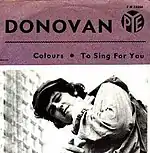Colours (Donovan song)
"Colours" is a song written and recorded by British singer-songwriter Donovan.[2] The "Colours" single was released in the United Kingdom on 28 May 1965 through Pye Records (Pye 7N 15866) and a few months later in the United States through Hickory Records (Hickory 45-1324). The "Colours" single was backed with "To Sing for You" (previously included on What's Bin Did and What's Bin Hid) on the United Kingdom release and "Josie" (from What's Bin Did and What's Bin Hid) on the United States release.
| "Colours" | ||||
|---|---|---|---|---|
 Dutch (Pye / Negram) sleeve | ||||
| Single by Donovan | ||||
| from the album Fairytale | ||||
| B-side |
| |||
| Released | 28 May 1965 (UK) June 1965 (United States) | |||
| Recorded | 1965 | |||
| Genre | Folk[1] | |||
| Length | 2:44 (Side A) 2:46 ("To Sing For You") 3:29 ("Josie") | |||
| Label | Pye 7N15866 (UK) Hickory 45-1324 (United States) | |||
| Songwriter(s) | Donovan Leitch | |||
| Producer(s) | Terry Kennedy, Peter Eden, Geoff Stephens | |||
| Donovan UK singles chronology | ||||
| ||||
| Donovan USA singles chronology | ||||
| ||||
Release and reception

Donovan followed up the success of "Catch the Wind" with "Colours", which featured a similar folk style. The single matched the success of "Catch the Wind" in the United Kingdom, reaching No. 4 on the charts.[3] In the United States, "Colours" reached No.61,[4] and marked a decline in the artist's popularity relative to "Catch the Wind". A different mix of the song (without harmonica) was released on his second album Fairytale. Billboard praised the "intriguing lyric and melody."[5] Cash Box described it as a "tender, slow-moving, rhythmic pledge of romantic devotion sold by the songster in his distinctive Bob Dylan-ish style."[6]
When Epic Records was compiling Donovan's Greatest Hits, they were either unable or unwilling to secure the rights to the original recordings of "Catch the Wind" and "Colours". Donovan re-recorded both songs in the studio with Big Jim Sullivan playing guitar, John Paul Jones on bass and keyboards and Clem Cattini on drums, produced by Mickie Most. The re-recordings were included on the greatest hits album.
Other versions by Donovan
- A live duet with Joan Baez from the 1965 Newport Folk Festival[2] is included on the 1995 compilation Folk Music at Newport, Part 1.
- The 2002 film The Rules of Attraction features a re-recorded version by Donovan which would after be used in various television commercials.
Covers by others
| "Colours" | ||||
|---|---|---|---|---|
| Single by No-Man | ||||
| B-side |
| |||
| Released | July 1990 (7") November 1990 (12") | |||
| Recorded | No-Man's Land, Hemel Hempstead (Title track) | |||
| Genre | Art rock, dream pop | |||
| Length | 10:29 (7") | |||
| Label | Hidden Art (7") Probe Plus (12") | |||
| Songwriter(s) | Donovan Leitch | |||
| Producer(s) | Steven Wilson, Tim Bowness and Ben Coleman | |||
| No-Man singles chronology | ||||
| ||||
- Joan Baez included a solo version of "Colours" on her 1965 album Farewell, Angelina.
- In 1967, Van Dyke Parks created a (loose) instrumental adaptation of this song titled "Donovan's Colours", which was released as a single (credited to George Washington Brown) and as a track on Parks' first album Song Cycle, respectively. This version features mostly the original chord progression, albeit in completely different ragtime arrangement.
- Donovan collaborated with the Spanish group Mocedades for a cover of the song with Spanish/English lyrics included in the latter's 1986 album Colores.
- Terence Stamp covered the song in the 1967 film Poor Cow. Footage of Stamp singing the song in this film would later appear as a closing flashback in the 1999 film The Limey which also starred Stamp.
- A cover of the song, released in 1990, was the first single of British art rock duo No-Man and the first release under their current name (their first releases from 1989 had their previous moniker "No Man Is An Island").[7] The later re-release of the song had an original song, "Drink Judas", as a b-side.[8] Both songs were later included in the duo's 1992 third EP: Lovesighs – An Entertainment, with "Drink Judas" being re-recorded and "Colours" remixed.[9]
- Finbar Furey included a version of "Colours" on his 2012 album of the same name.[10]
- "Žlutá" by Zdena Lorencová was released in Czechoslovakia in 1972. This interpretation has lyrics in Czech, which are mainly about yellow (Czech: žlutá).
References
- Stanley, Bob (13 September 2013). "An English Pastoral: Folk Rock". Yeah Yeah Yeah: The Story of Modern Pop. Faber & Faber. p. 299. ISBN 978-0-571-28198-5.
- "Show 48 – The British are Coming! The British are Coming!: With an emphasis on Donovan, the Bee Gees and the Who. [Part 5] : UNT Digital Library". Digital.library.unt.edu. Retrieved 28 June 2014.
- "officialcharts.com". officialcharts.com. Retrieved 23 February 2021.
- Whitburn, Joel (2013). Joel Whitburn's Top Pop Singles, 14th Edition: 1955-2012. Record Research. p. 251.
- "Spotlight Singles" (PDF). Billboard. 24 July 1965. p. 14. Retrieved 11 March 2021.
- "CashBox Record Reviews" (PDF). Cash Box. 24 July 1965. p. 12. Retrieved 12 January 2022.
- "Colours by No-Man (Single, Art Pop): Reviews, Ratings, Credits, Song list". Rate Your Music. Retrieved 28 June 2014.
- "Colours by No-Man (Single; ; PP 27 T): Reviews, Ratings, Credits, Song list". Rate Your Music. Retrieved 28 June 2014.
- "Steven Wilson – The Complete Discography (9th Edition)" (PDF). Voyage-pt.de. Retrieved 28 June 2014.
- "Colours". Valley Entertainment. Retrieved 17 March 2014.
External links
- Colours (Single) – Donovan Unofficial Site Archived 18 August 2010 at the Wayback Machine